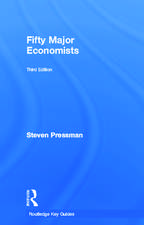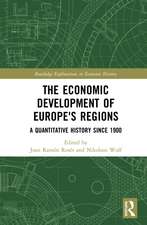Complex Economics: Individual and Collective Rationality: The Graz Schumpeter Lectures
Autor Alan Kirmanen Limba Engleză Paperback – 16 ian 2011
The economy should be considered as a complex adaptive system in which the agents constantly react to, influence and are influenced by, the other individuals in the economy. In such systems which are familiar from statistical physics and biology for example, the behaviour of the aggregate cannot be deduced from the behaviour of the average, or "representative" individual. Just as the organised activity of an ants’ nest cannot be understood from the behaviour of a "representative ant" so macroeconomic phenomena should not be assimilated to those associated with the "representative agent". This book provides examples where this can clearly be seen. The examples range from Schelling’s model of segregation, to contributions to public goods, the evolution of buyer seller relations in fish markets, to financial models based on the foraging behaviour of ants.
The message of the book is that coordination rather than efficiency is the central problem in economics. How do the myriads of individual choices and decisions come to be coordinated? How does the economy or a market, "self organise" and how does this sometimes result in major upheavals, or to use the phrase from physics, "phase transitions"? The sort of system described in this book is not in equilibrium in the standard sense, it is constantly changing and moving from state to state and its very structure is always being modified. The economy is not a ship sailing on a well-defined trajectory which occasionally gets knocked off course. It is more like the slime described in the book "emergence", constantly reorganising itself so as to slide collectively in directions which are neither understood nor necessarily desired by its components.
| Toate formatele și edițiile | Preț | Express |
|---|---|---|
| Paperback (1) | 413.37 lei 6-8 săpt. | |
| Taylor & Francis – 16 ian 2011 | 413.37 lei 6-8 săpt. | |
| Hardback (1) | 1112.83 lei 6-8 săpt. | |
| Taylor & Francis – 29 iul 2010 | 1112.83 lei 6-8 săpt. |
Preț: 413.37 lei
Nou
Puncte Express: 620
Preț estimativ în valută:
79.10€ • 82.58$ • 65.46£
79.10€ • 82.58$ • 65.46£
Carte tipărită la comandă
Livrare economică 04-18 aprilie
Preluare comenzi: 021 569.72.76
Specificații
ISBN-13: 9780415594240
ISBN-10: 0415594243
Pagini: 272
Ilustrații: 21 Line drawings, color; 47 Line drawings, black and white; 1 Tables, black and white; 21 Illustrations, color; 47 Illustrations, black and white
Dimensiuni: 156 x 234 x 14 mm
Greutate: 0.39 kg
Ediția:1
Editura: Taylor & Francis
Colecția Routledge
Seria The Graz Schumpeter Lectures
Locul publicării:Oxford, United Kingdom
ISBN-10: 0415594243
Pagini: 272
Ilustrații: 21 Line drawings, color; 47 Line drawings, black and white; 1 Tables, black and white; 21 Illustrations, color; 47 Illustrations, black and white
Dimensiuni: 156 x 234 x 14 mm
Greutate: 0.39 kg
Ediția:1
Editura: Taylor & Francis
Colecția Routledge
Seria The Graz Schumpeter Lectures
Locul publicării:Oxford, United Kingdom
Public țintă
Postgraduate and UndergraduateCuprins
1. Introduction 2. The Structure of Interaction 3. Fish Markets: An Example of the Emergence of Aggregate Coordination 4. Financial Markets: Bubbles, Herds and Crashes 5. Public Goods: A coordination problem 6. Segregation: Schelling’s Model 7. Conclusion
Notă biografică
Alan Kirman is Professor Emeritus at l’Université d’Aix-Marseille lll and l’Ecole des Hautes Etudes en Sciences Sociales, France.
Recenzii
‘What a refreshing read! Alan Kirman draws on his immense experience of how real people trade, from the Marseille and Ancona fish markets to experiments on public goods games, to propose an approach to economics centred on interaction between individuals and its consequences for aggregate behaviour. This book is essential reading in the quest for new economic thinking’.
- Prof. Robert MacKay, University of Warwick, UK
‘What a refreshing read! Alan Kirman draws on his immense experience of how real people trade, from the Marseille and Ancona fish markets to experiments on public goods games, to propose an approach to economics centred on interaction between individuals and its consequences for aggregate behaviour. This book is essential reading in the quest for new economic thinking’.
- Prof. Robert MacKay, University of Warwick, UK
'Alan Kirman identifies the two key issues in interpreting the workings of the economy and related social interactions (e.g., public goods): the variability across individuals and the surprising degree of coordination. He explores these topics in many contexts, going well beyond the standard equilibrium analysis. This is an outstanding coverage, not blinking the difficult issues and unresolved problems but casting light where possible.'
-Kenneth J. Arrow, Professor of Economics (Emeritus), Stanford University, UK
'I have always followed the simple rule of thumb: If Alan Kirman writes anything, push everything else aside and read it right away. I did the same when his new book arrived. His book is beautifully written and shows the power of complex adaptive systems thinking for increasing the ability of economic science to do a better job of understanding real economies. One of my favorites is how he shows that it helps to understand internal forces that can cause abrupt and surprising change. But there is much more in this book which is what one would expect since, Kirman is a master contributor to many areas of economics. You will not only learn a lot from reading this amazing book but you will be entertained and break out into peals of laughter as well.'
-William A. Brock, Vilas Research Professor, University of Wisconsin-Madison, USA
- Prof. Robert MacKay, University of Warwick, UK
‘What a refreshing read! Alan Kirman draws on his immense experience of how real people trade, from the Marseille and Ancona fish markets to experiments on public goods games, to propose an approach to economics centred on interaction between individuals and its consequences for aggregate behaviour. This book is essential reading in the quest for new economic thinking’.
- Prof. Robert MacKay, University of Warwick, UK
'Alan Kirman identifies the two key issues in interpreting the workings of the economy and related social interactions (e.g., public goods): the variability across individuals and the surprising degree of coordination. He explores these topics in many contexts, going well beyond the standard equilibrium analysis. This is an outstanding coverage, not blinking the difficult issues and unresolved problems but casting light where possible.'
-Kenneth J. Arrow, Professor of Economics (Emeritus), Stanford University, UK
'I have always followed the simple rule of thumb: If Alan Kirman writes anything, push everything else aside and read it right away. I did the same when his new book arrived. His book is beautifully written and shows the power of complex adaptive systems thinking for increasing the ability of economic science to do a better job of understanding real economies. One of my favorites is how he shows that it helps to understand internal forces that can cause abrupt and surprising change. But there is much more in this book which is what one would expect since, Kirman is a master contributor to many areas of economics. You will not only learn a lot from reading this amazing book but you will be entertained and break out into peals of laughter as well.'
-William A. Brock, Vilas Research Professor, University of Wisconsin-Madison, USA
Descriere
The economic crisis is also a crisis for economic theory. Most analyses of the evolution of the crisis invoke three themes, contagion, networks and trust, yet none of these play a major role in standard macroeconomic models. In this book Kirman argues for a theory in which these aspects are central.



















![Le Livre D'Or de Marseille, de Son Commerce Et de Ses Industries: Compte-Rendu [...] de La Situation Maritime, Commerciale, Industrielle, Coloniale](https://i3.books-express.ro/bt/9782013453431/le-livre-d-or-de-marseille-de-son-commerce-et-de-ses-industries.jpg)












